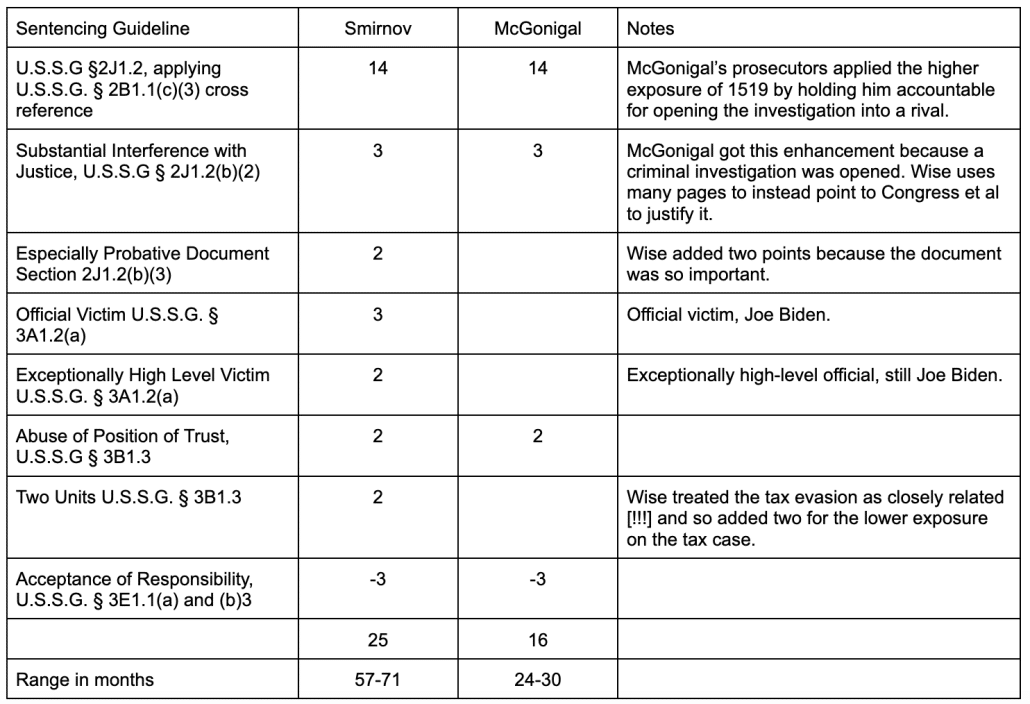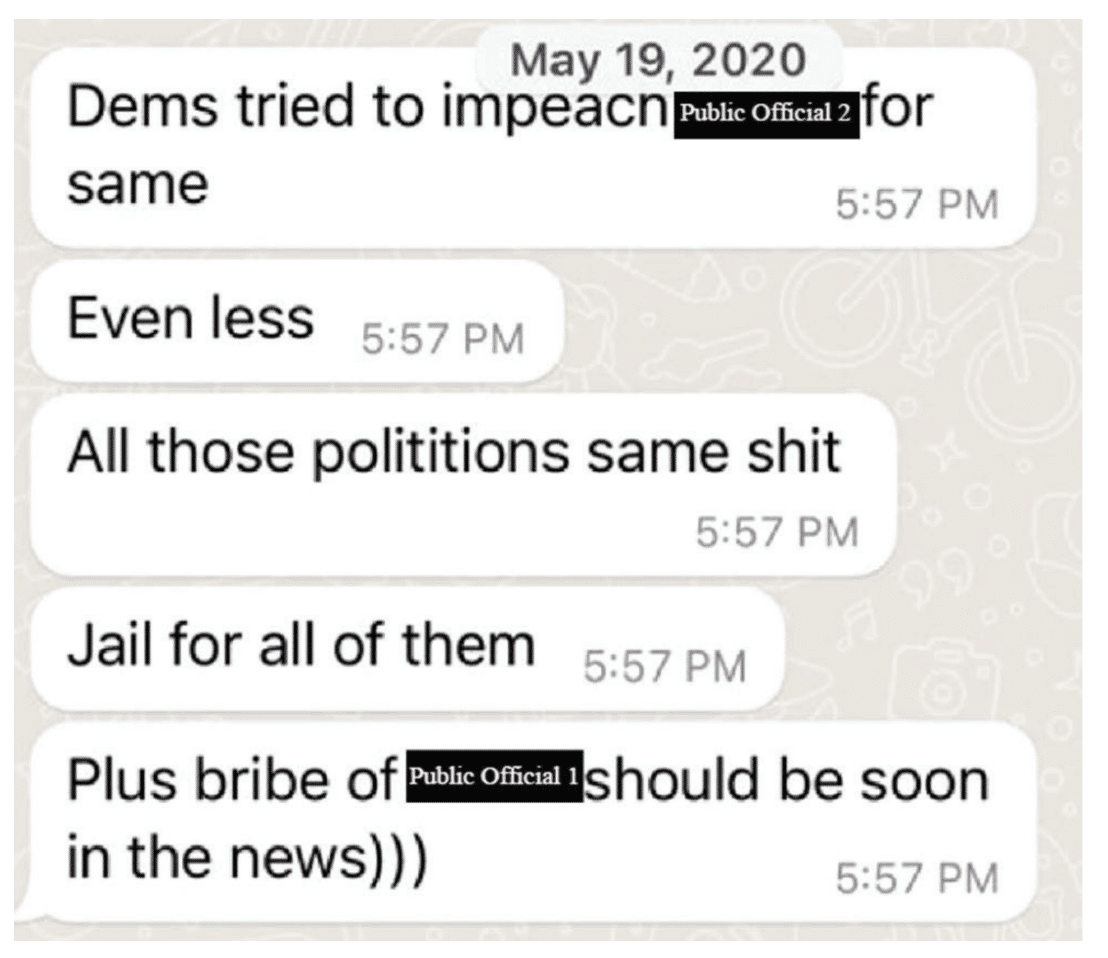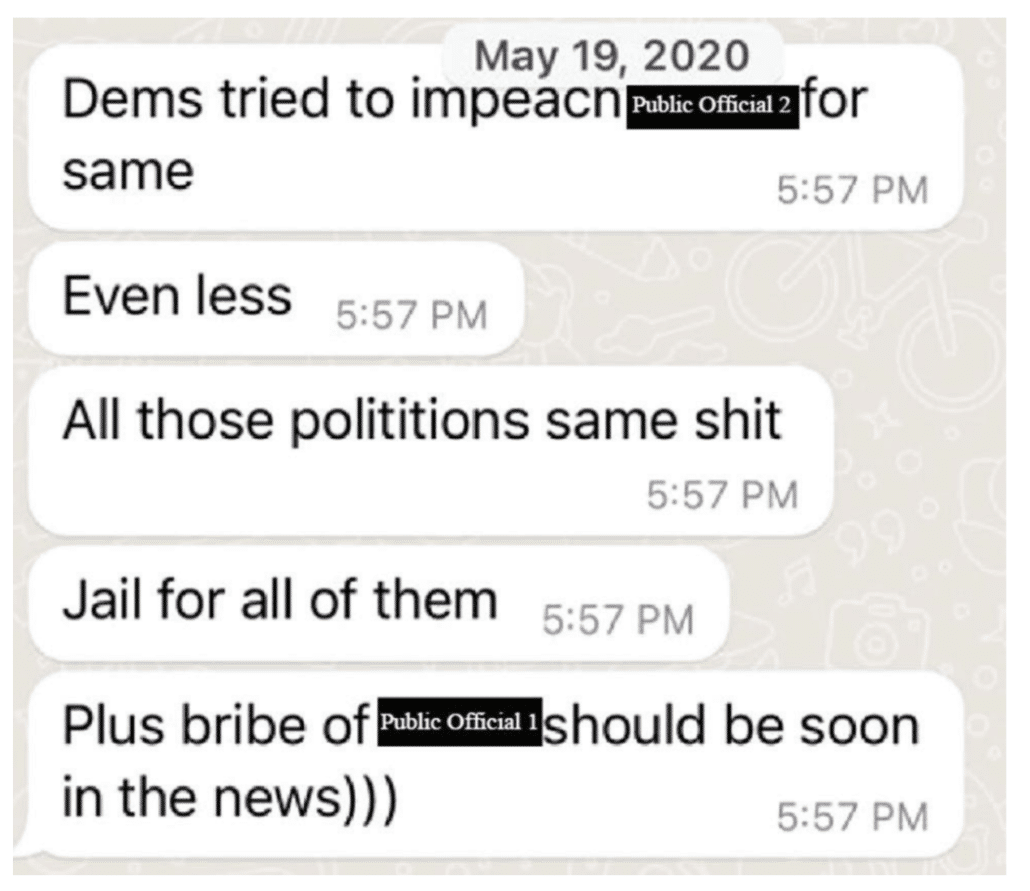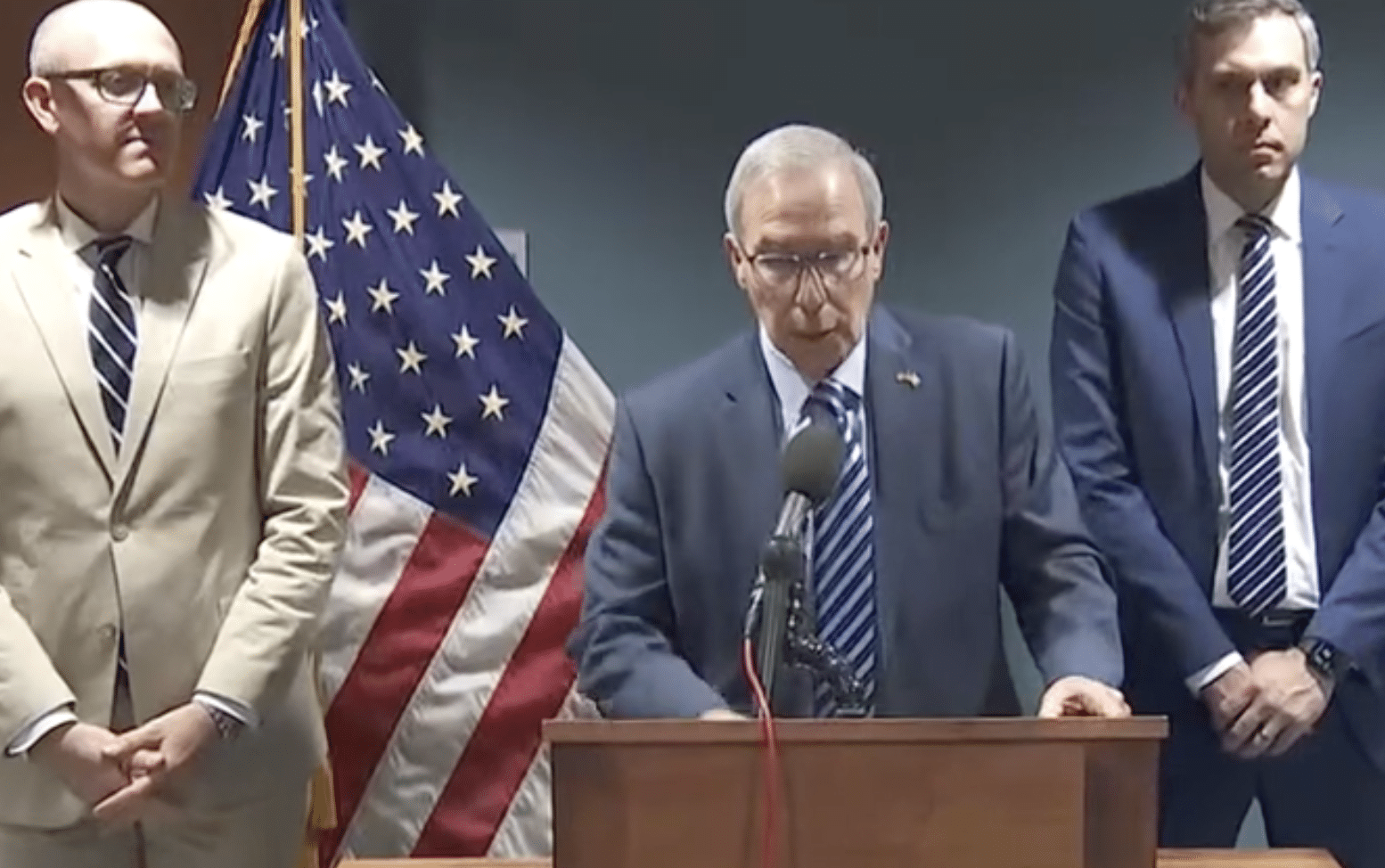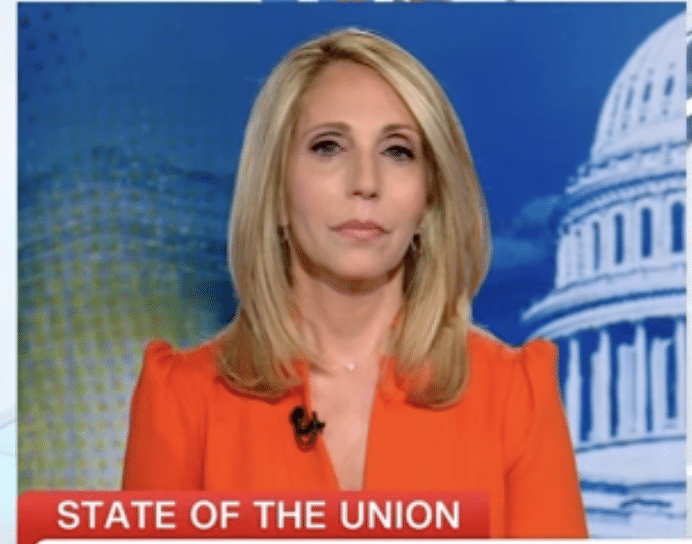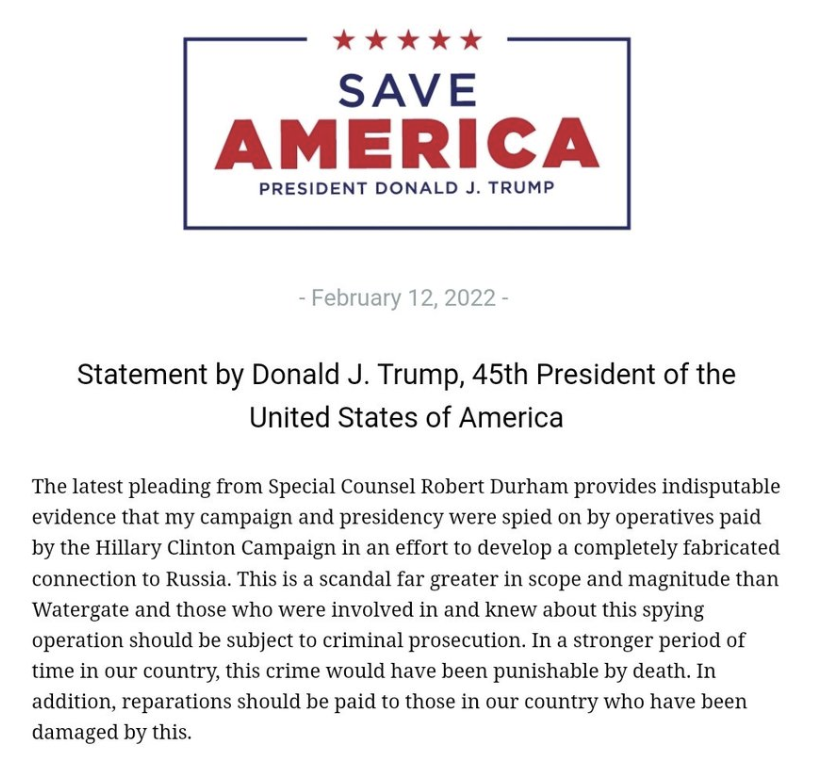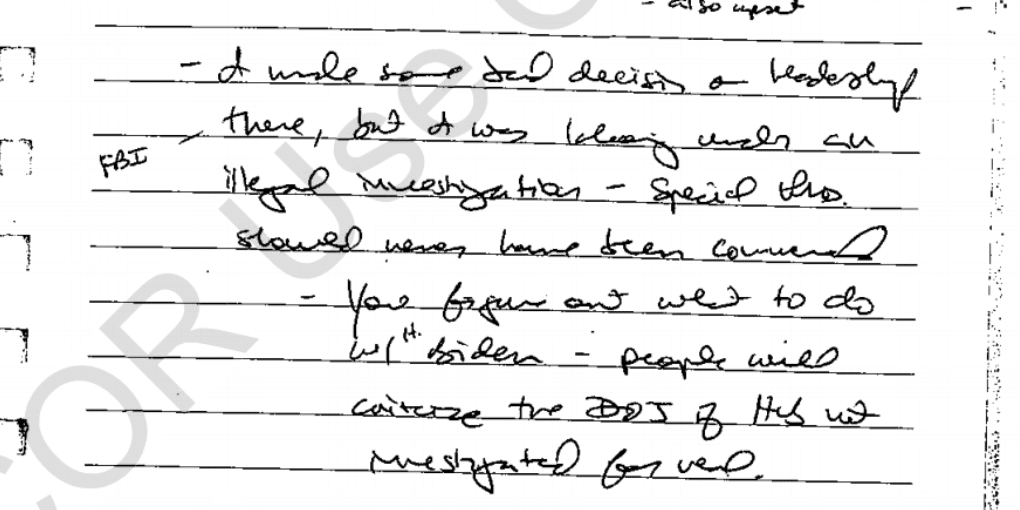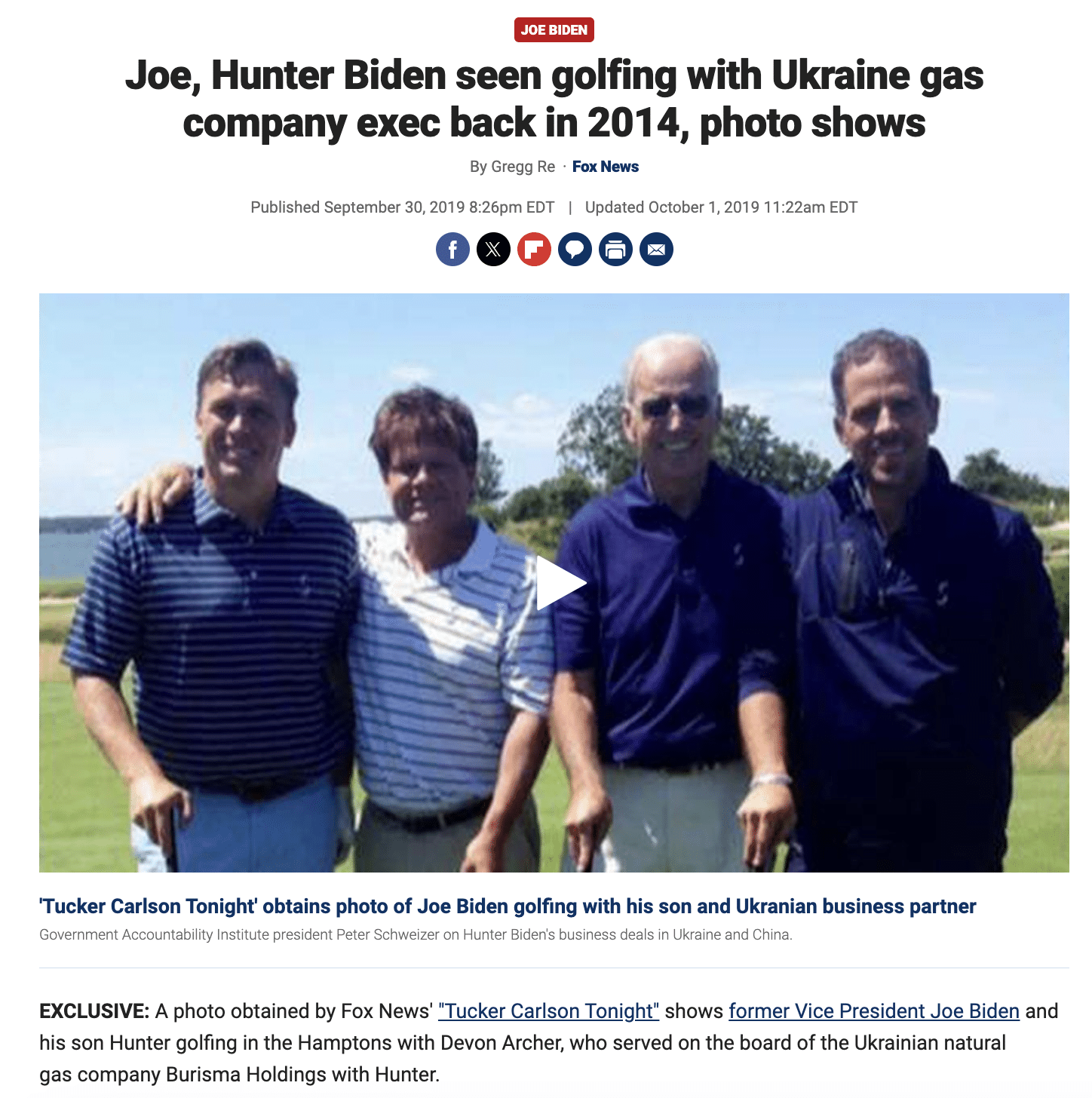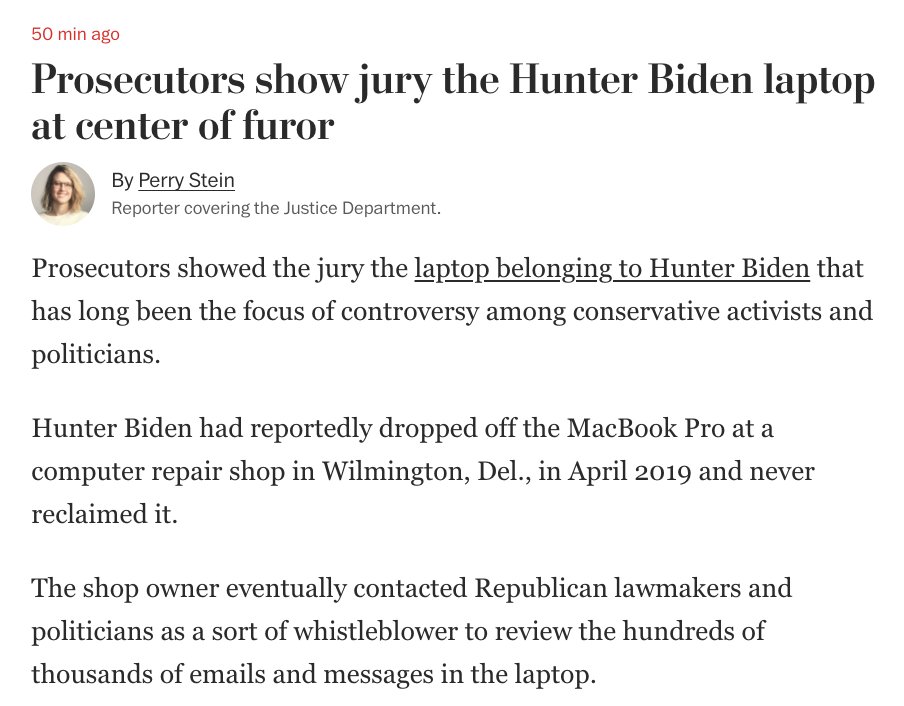Leo Wise Buries Bill Barr with Six Year Sentencing Recommendation
To be absolutely clear, David Weiss’s lead prosecutor Leo Wise did not bury Bill Barr with a recommendation that Bill Barr be sentenced to six years in prison for framing Joe Biden.
No.
Leo Wise argued that Alexander Smirmov should be sentenced to six years in prison for (in addition to cheating on his taxes over three years) providing a false claim that Mykola Zlochevsky had bribed Joe Biden via the side channel that Bill Barr set up in the wake of Trump’s search for bribery allegations against Joe Biden.
In 2020, Smirnov and his willingness to make false claims about Donald Trump’s opponent were magically discovered by a team Barr ordered Pittsburgh US Attorney Scott Brady to convene. After that team magically discovered Smirnov, the FBI magically failed basic vetting, such that they took travel records showing no evidence Smirnov took trips he claimed to have taken and, from those, declared his travel records corroborated his claims.
Remember, vetting was, if you believe in magic, the entire point of the Brady side channel!
That would have been the end of things. Except then, one after another Republican kept magically rediscovering Smirnov’s false claim, each time using it as an excuse to ratchet up further investigation into Hunter and Joe Biden.
That happened in October 2020 after Donald Trump yelled at Bill Barr. That happened in May 2023. That happened in June 2023. And that happened when Leo Wise decided to chase the allegation in July 2023.
And in his sentencing memo, Leo Wise has argued that Smirnov should be punished with six years in prison because of Scott Brady and Bill Barr and Jamie Comer and Jim Jordan and Donald Trump and Leo Wise’s lust to pursue a claim that Joe Biden took a bribe.
Before I get into the story Wise tells to get there, check out how his sentencing recommendation compares to Charles McGonigal’s, who in addition to lying on FBI disclosure forms in order to hide that he had a side foreign partner paying him $225,000, like Smirnov, caused a false investigation to be filed against someone (the rival of McGonigal’s Albanian partner).
The left column is sentencing guidelines mumbo jumbo, but what you need to know is that prosecutors were arguing sentences for the same base level crime, 18 USC 1519 (altering a document) with a baseline of 14 points. Both were slapped with enhancements because their false claims led the government to take investigative steps (more on that below). Leo Wise argued that non-employee FBI informant Smirnov should get the same penalty for abusing his position of trust, 2 points, as a NY Field Office Special Agent in Charge (though that may be the only available enhancement). Then on top of the enhancements McGonigal got for hiding his side business from the FBI and investigating his partner’s rival, Wise argued Smirnov should get 2 points for how important the document is, and then first 3 and then another 2 points for framing a former Vice President during a Presidential election and also because his document was used again while Biden was President, including when Leo Wise decided to chase it.
One way you can tell this whole sentencing process — likely this whole plea deal — is a sham, is that Smirnov’s excellent attorneys didn’t do the analysis I just did (to say nothing of comparing Smirnov to Kevin Clinesmith, who altered an FBI email and whose victim was a former Trump campaign aide, yet got probation), showing that Leo Wise wants to punish Smirnov more aggressively than a guy who sold out the FBI and also caused a false investigation to be opened. The comparators Smirnov’s excellent attorneys invoked all involve people who got probation for conduct similar to Smirnov’s (but again, mysteriously not Clinesmith). Even if you assume Smirnov should go to prison for framing Joe Biden, though, it’s hard to see how his betrayal is worse than McGonigal’s.
Another way we can tell the whole sentencing process is a sham is that, as I speculated, the 4-6 year sentencing included in the deal was totally arbitrary, probably intended to serve some other purpose, maybe frame Joe Biden? Turns out even with all those enhancements, Leo Wise still only got to a 57 to 71 month range, but that didn’t stop him from asking for 72 months anyway. The range was, indeed, not based on guidelines, nor is it yet.
Which is where we finally get to the story Leo Wise told about all this, and ultimately to where he has hidden Bill Barr, the guy who ordered up the side channel that magically found a way to frame Joe Biden and then, in 2023, who made claims about the process with the result that the same Smirnov claim ended up framing Joe Biden a second time.
Leo Wise tells the story of how this all went down twice. The first time (in the section laying out Smirnov’s crime), he mostly stuck to what Wise put in the indictment, starting with the Brady side channel, to which Wise adds the letter to Jerry Nadler intended for public consumption, attributing the side channel to Jeffrey Rosen, not the guy mentioned in Trump’s perfect phone call who ordered Brady to open the side channel and to whom Brady personally reported on it.
In June 2020, the Handler reached out to the Defendant concerning the 2017 1023. Obstruction of Justice Indictment (Exhibit 2) ¶ 22. This was done at the request of the FBI’s Pittsburgh Field Office (hereafter “FBI Pittsburgh”). Id. In the first half of 2020, the United States Attorney’s Office for the Western District of Pennsylvania (hereafter “USAO WDPA”) had been tasked by the Deputy Attorney General of the United States to assist in the “receipt, processing, and preliminary analysis of new information provided by the public that may be relevant to matters relating to Ukraine.” Id.; see also February 18, 2020 Letter to The Honorable Jerrold Nadler (Exhibit 8). As part of that process, FBI Pittsburgh opened an assessment, 58A-PG-3250958, and in the course of that assessment identified the 2017 1023 in FBI holdings and shared it with USAO WDPA. Id. USAO WDPA then asked FBI Pittsburgh to reach out to the Handler to ask for any further information about the reference in his 2017 1023 that stated, “During this call, there was a brief, non-relevant discussion about former [Public Official1]’s son, [Businessperson 1], who is currently on the Board of Directors for Burisma Holdings [No Further Information]”. Id.
From there, Wise vaguely describes how, in July 2023, the FBI asked the people who were already investigating Hunter Biden to look into the Smirnov allegation, mentioning as well that, having magically gotten a copy of the 1023, Charles Grassley released it on a date Leo Wise chooses not to include: July 20, 2023.
In July 2023, the FBI requested that the U.S. Attorney’s Office for the District of Delaware assist the FBI in an investigation of allegations related to the 2020 1023. Obstruction of Justice Indictment (Exhibit 2) ¶ 41. At that time, the United States Attorney’s Office for the District of Delaware was handling an investigation and prosecution of Businessperson 1. Id.
Also in July 2023, a member of the United States Senate posted the 2020 1023 on his official website, making the Defendant’s false allegations against Public Official 1 public. https://www.grassley.senate.gov/news/news-releases/grassley-obtains-andreleases-fbi-record-alleging-vp-biden-foreign-bribery-scheme (Exhibit 5).
On August 11, 2023, the Attorney General appointed David C. Weiss, the United States Attorney for the District of Delaware, as Special Counsel. Obstruction of Justice Indictment (Exhibit 2) ¶ at 42. The Special Counsel was authorized to conduct the investigation and prosecution of Businessperson 1, as well as “any matters that arose from that investigation, may arise from the Special Counsel’s investigation, or that are within the scope of 28 C.F.R. § 600.4(a).” Id
On August 29, 2023, FBI investigators spoke with the Handler in reference to the 2020 1023. Id. at ¶ 43. During that conversation, the Handler indicated that he and the Defendant had reviewed the 2020 1023 following its public release by members of Congress in July 2023, and the Defendant reaffirmed the accuracy of the statements contained in it. Id.
No need to tell Judge Otis Wright about how sometime before July 10 — and probably as early as June 19, when Leo Wise came in and David Weiss started to renege on a signed plea deal — David Weiss was already investigating the allegation. Blame it on Chuck.
In this telling, Wise buries Barr’s personal role in setting up the side channel in January 2020, as well as Barr’s personal role in inflaming things in June 2023 — about the time that Weiss started reneging on a plea deal — by telling Margot Cleveland that he had told David Weiss to investigate this in 2020.
It’s not true. It wasn’t closed down,” William Barr told The Federalist on Tuesday in response to Democrat Rep. Jamie Raskin’s claim that the former attorney general and his “handpicked prosecutor” had ended an investigation into a confidential human source’s allegation that Joe Biden had agreed to a $5 million bribe. “On the contrary,” Barr stressed, “it was sent to Delaware for further investigation.”
[snip]
But that’s just not true, according to the former attorney general. Instead, the confidential human source’s claims detailed in the FD-1023 were sent to the Delaware U.S. attorney’s office for further investigation, according to Barr.
Wise then tells the story again later, when he tries to lard on how much work Smirnov caused because he had the bad luck of having his willingness to make shit up about Joe Biden discovered by people who were hoping to make shit up about Joe Biden.
Wise doesn’t explain how Brady’s folks would even come across Smirnov’s allegation if all they were doing was vetting open source tips. It’s Smirnov’s fault Brady magically started searching on Burisma and Hunter Biden and discovered a guy who started offering to make shit up about Joe Biden a month earlier.
In 2020, the FBI, through the Pittsburgh Field Office, and the U.S. Department of Justice, through the U.S. Attorney’s Office for the Western District of Pennsylvania, assigned investigators and prosecutors to pursue the false allegations that the Defendant made that were memorialized in the 2020 1023. For example, the document titled “Open Items for Completion by PG” shows various investigative steps that FBI Pittsburgh and FBI Seattle, where the Defendant’s Handler was located, took in an attempt to assess the credibility of the allegations the Defendant first reported in 2020 that were memorialized in the 2020 1023. Exhibit 6
In 2023, the FBI assigned a second team of investigators, through the FBI’s Wilmington RA and the U.S. Department of Justice, through the U.S. Attorney’s Office for the District of Delaware and later the Special Counsel’s Office, to investigate the Defendant’s allegations. This second group of FBI agents and prosecutors took investigative steps that caused them to conclude that the Defendant was lying and that he should be prosecuted himself for these lies.
In any event, significant Justice Department resources were expended determining that the Defendant’s false allegations were lies
Then it blames Smirnov — and not the GOPers seeking to frame Joe Biden — for the efforts FBI had to take in an effort to tamp down GOP efforts to find a way to frame Joe Biden.
In addition, the 1023 caused the substantial expenditure of government resources by the U.S. Congress and the FBI and Department of Justice in the Congressional oversight process. The following is a summary by FBI Director Wray of the actions taken by the Congress and the FBI and Justice Department specifically related to the 2020 1023
Most remarkably, given the way Leo Wise obscures that, after Barr publicly declared that David Weiss had been ordered to investigate the Smirnov allegation, a claim backed by multiple public records, David Weiss had publicly confirmed he was looking at the Smirnov allegations before someone magically gave Chuck Grassley a copy to leak, to argue for the extra two point enhancement for a super duper victim, the President of the United States!, Wise complains that Smirnov retold his lie when Wise (and Weiss) came calling, or maybe it’s that Comer and Jordan were trying to frame Joe Biden while he was President, or maybe it was all an election interference stunt.
The upward departure contemplated in Application Note 5 differs from Section 3A1.2 in two important ways. First, it uses the present tense “if the official victim is an exceptionally high-level official …” (emphasis added). When the Defendant was interviewed in September 2023 and repeated his false accusations against Joseph R. Biden, which is described in the indictment and is relevant conduct, Joseph R. Biden was the President of the United States. So that requirement is met. Second, the last phrase in the application note refers to “potential disruption of the governmental function,” which is an additional requirement that must be met to justify an additional upward departure. Congressional oversight is a “governmental function.” At the time the Defendant repeated his false accusations in September 2023, the Congress was actively involved in examining the Defendant’s false claims in the 2020 1023. The 2020 1023 was released publicly in July and, as described above, the Congress and the Executive Branch had taken numerous steps to address its claims. The Defendant’s choice to repeat his false claims when he was interviewed by the FBI in September 2023 had the potential to further disrupt the oversight process, which is a governmental function.
Further, at the time the Defendant was interviewed President Biden was a candidate for re-election. The Supreme Court has long recognized a state’s compelling interest in regulating elections, i.e. in securing the right to vote freely and effectively. Burson v. Freeman, 504 U.S. 191 (1992); see also Mills v. Alabama, 384 U.S. 214 (1966); Oregon v. Mitchell, 400 U.S. 112 (1970). The Defendant’s false statements had the potential to disrupt the conduct of federal elections by spreading misinformation about the presumptive nominee of one of the two major American political parties in the 2024 elections.
This all gets to be a bit much.
The truth of the matter is Donald Trump ordered his people to frame Joe Biden, Bill Barr set up a way to facilitate that process, they magically found a way to do that, and after Lesley Wolf tried to save David Weiss from all this in 2020, Leo Wise came along and — goaded on by an entire Congress trying to frame Joe Biden — decided he knew better and would pursue the same allegations that didn’t make sense three years earlier.
And here we are and all of this is the fault of Alexander Smirnov, and — according to Leo Wise — he should face the kind of obstruction sentence never before seen because the entire Republican party facilitated his effort to frame Joe Biden.
Alexander Smirnov was willing to frame Joe Biden and he got caught. But he got caught because the entire GOP renewed the effort to frame Joe Biden, over and over and over again.
Yet for that, only Alexander Smirnov should face a six year sentence, Leo Wise says.


